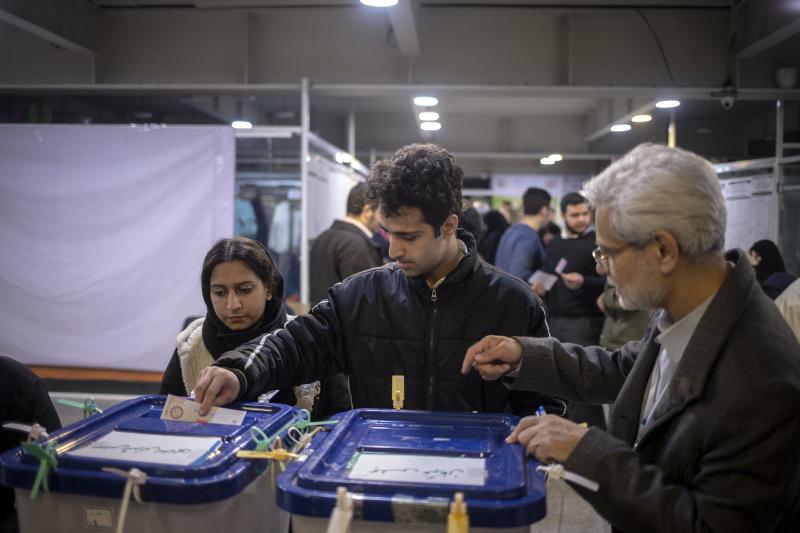US pressure pushes Iran further right
- By Jin Liangxiang
 0 Comment(s)
0 Comment(s) Print
Print E-mail China.org.cn, February 24, 2020
E-mail China.org.cn, February 24, 2020

On February 21, Iran held its new legislative election on schedule, although it may be some months before the full results are available, as a number of the candidates must face a second round of competition.
Yet, it is almost certain it will turn out to be a robust comeback of the conservatives, mainly driven by an external factor, specifically the American hardline policy toward Iran in the last few years.
Iran's parliamentary elections take place every four years, one year ahead of presidential election, the last such vote being in 2016. It will produce a chamber of 290 members from 31 provinces, with five seats designated for minority religious groups.
The competition will be mainly between conservative bloc, which is also called the principalist camp, and reformists from the centrist and moderate camps.
Elections are always internal affairs in theory; however, the factional divisions in Iran actually derive from differences in foreign policy. Conservatives can be regarded as those who strongly oppose the U.S. and the West in general, while reformists want to improve relations in that direction.
This year's election, though the result remains to be seen, had been reasonably predicted to produce a big win for conservatives, a major reverse to the outcome of 2016 election. In 2016 election the reformists, conservatives and independents respectively won 41%, 29% and 28% of the vote.
The conservative turn has been widely attributed by Western media to the disqualifying mechanism of Iran's political system. According to reports, a total of 14,444 people applied to be candidates, but 7,296 (51%) were disqualified by the Guardian Council, reformist candidates being mainly those vetted out.
It is true that there exists a kind of institutional conservatism in Iran. As part of the Faqih system, the Guardian Council has the responsibility to decide on candidate eligibility. In some way, this mechanism ought to favor conservatism, but in general it has not done so.
The main criterion of the selection is supposed to be whether the candidates are loyal to the Islamic system, which is the most important element. Their political background is not necessarily the benchmark. In fact, both reformists and conservatives are part of the system.
For instance, former Iranian presidents, including Hashemi Rafsanjani and Mohammad Khatami, and the incumbent president, Hassan Rouhani, all received education in religious seminaries, and have all been from the clerical community, thus eligible for the presidential elections.
And reformists are not always been eliminated for their political background and actually have provided the largest number of candidates in several previous elections.
The conservative turn of the Guardian Council is actually a part of the changing trend of the political thought in general, and it is a result itself rather than the cause. This should be natural consequence of the frustration of the latest efforts by Hassan Rouhani's government to become reintegrated with the international system.
When he was elected president for the first term in 2013, he was committed to leading Iran to improve its relations with the West. He received a phone call from the then U.S. President Barack Obama in September 2013 while travelling to New York for the U.N. Assembly, reached an interim agreement with the 6+1 grouping in November the same year, and reached the final nuclear deal with relevant parties in July 2015. He was inspired to do so by a desire to get international sanctions removed and put in order Iran's relations with the West.
Unfortunately, President Rouhani's initial successful move in this regard proved unsustainable. Since Donald Trump entered the White House in early 2017, the U.S. has taken steps, collectively known as "Maximum Pressure," against Iran, including withdrawing from the nuclear deal, resuming sanctions, and designating Iran's IRGC as terror organization.
These steps culminated in Trump ordering the assassination of Soleimani, the IRGC general highly respected by Iranians, on January 3, 2020.
As is obvious, these new developments have not only disrupted the interactions between Iran and the U.S. but also have produced, and will produce, various long-term negative implications in Iran's domestic politics.
Trump's reneging on the deal has proved to be extremely detrimental on the prestige of Rouhani and his government. Because of Trump's withdrawal, renegotiating a deal has been regarded as politically not right, and the killing of Soleimani has totally discredited Rouhani's approach to the U.S.
This kind of evolution of political atmosphere is also reflected in the debates before the parliamentary elections. When reformists were talking about the negotiation with the U.S., conservatives retorted that a deal had already been negotiated, so there was no need for another.
That is the widely accepted reasoning in Iran's political circle. Within this context, how can reformists bloc persuade their constituency and the political establishment to accept their arguments?
Ironically, the U.S. might hope the reformists stay at the helm of Iran's politics, but its own actions have made this impossible.
Jin Liangxiang is Senior Research Fellow with the Center for West Asian and African Studies, Shanghai Institutes for International Studies. For more information please visit:
http://www.china.org.cn/opinion/jinliangxiang.htm
Opinion articles reflect the views of their authors, not necessarily those of China.org.cn.
If you would like to contribute, please contact us at opinion@china.org.cn.






Go to Forum >>0 Comment(s)